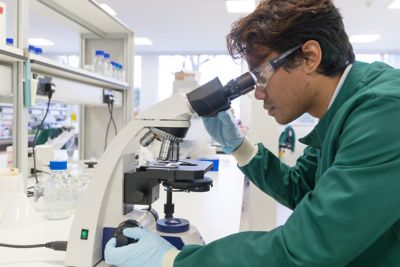This is the place where learning goes beyond the lecture theatre
Find out why third year Animal Sciences student, Charlotte, enjoyed the Principles of Animal Health and Disease module

One of Charlotte’s favourite module is Principles of Animal Health and Disease, which you can study in your second year.
This module builds on content covered in modules you can take in your first year to help you understand the effects of disease in animals and learn about commonly used diagnosis techniques.
Plus, for your assessment, you’ll take part in a group debate where you have the chance to articulate what you’ve learnt during the module and practise your communication skills in a group.
The module is open to a whole range of courses, like Animal Sciences, Biotechnology and Agriculture. This gives you a great opportunity to meet people from other courses and learn alongside students with different academic backgrounds and perspectives.
Teaching is split across lectures and practicals, which gives you a great chance to apply your learning to a real-life situation and build your confidence for the future.
Most of the lab practicals are based in the North Lab on Sutton Bonington campus. This module mostly uses the Peter Buttery Teaching Laboratory, which is also known as the ‘Super Lab’. Here you’ll practise diagnostic techniques and apply them to real-life situations. For example, you learn how to perform an enzyme-linked immunosorbent assay (ELISA) to identify the possible presence of Avian Influenza on three scenario farms.
The animal handling sessions are a real highlight for our students, there are 4 rotations to cover a range of animals including equine, sheep, poultry and canine handling.
Plus, if you enjoy this module, the Animal Science course offers the choice to take the follow-up module in year three called Principles of Animal Health and Disease 2.